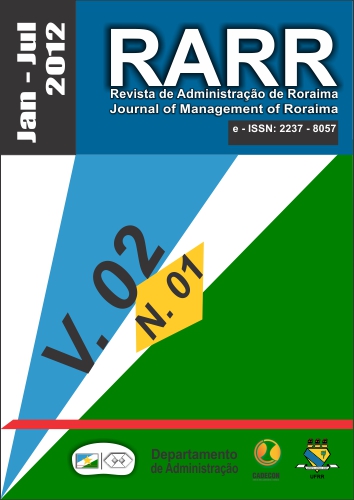Análise do impacto do relacionamento interpessoal no desempenho das pessoas nas organizações: um estudo de caso
DOI:
https://doi.org/10.18227/rarr.v2i1.770Palavras-chave:
desempenho, relacionamento interpessoal, reputaçãoResumo
O comportamento dos indivíduos é um fator que influi, notavelmente, o desenvolvimento da organização, já que, colaboradores desmotivados com o trabalho exercem suas atribuições com pensamentos alheios, e quando motivados, trabalham satisfeitos, aumentando assim sua produção. Diante disto, faz-se necessário avaliar qual o impacto do relacionamento interpessoal no desenvolvimento das tarefas, sendo este o objetivo geral da pesquisa, uma vez que, as organizações vêm buscando evitar problemas gerados por conflitos pessoais, que resultam, geralmente, em perda de bons profissionais, clientes, gestores e fornecedores. Metodologicamente, esta pesquisa qualiquantitativa de caráter censitário, analisou as interações sociais de vinte e seis funcionários públicos do Departamento de Recursos Humanos de um órgão do Poder Judiciário, através de survey, entrevistas em profundidade e observação participativa. A análise dos dados foi feita através dos programas UCINET 6.289 e PAJEK 1.19, programas estes utilizados para a análise de redes sociais. Estes dados foram triangulados com dados obtidos através de análise de conteúdo das entrevistas e das observações feitas. Como resultados, identificou-se que os atores com maior grau de centralidade, que identifica a capacidade de influenciar aos demais, nas relações de amizade já atuam no setor a mais de seis anos e os menos centrais estão a menos de dois anos no setor. Porém, o tempo no setor não justifica que os atores mais centrais da medida do grau de intermediação, que identifica a capacidade de unir pessoas não diretamente relacionadas, uma vez que, nesta medida, os mais centrais se mostram mais comunicativos e simpáticos.Downloads
Publicado
Edição
Seção
Licença
PORTUGUÊS Autores que publicam nesta revista concordam com os seguintes termos: 1.Autores mantém os direitos autorais e concedem à revista o direito de primeira publicação, com o trabalho simultaneamente licenciado sob a Licença Creative Commons Attribution que permite o compartilhamento do trabalho com reconhecimento da autoria e publicação inicial nesta revista. 2. Autores têm autorização para assumir contratos adicionais separadamente, para distribuição não-exclusiva da versão do trabalho publicada nesta revista (ex.: publicar em repositório institucional ou como capítulo de livro), com reconhecimento de autoria e publicação inicial nesta revista. 3. Autores têm permissão e são estimulados a publicar e distribuir seu trabalho online (ex.: em repositórios institucionais ou na sua página pessoal) a qualquer ponto antes ou durante o processo editorial, já que isso pode gerar alterações produtivas, bem como aumentar o impacto e a citação do trabalho publicado O Efeito do Acesso Livre. ENGLISH Authors who publish with this journal agree to the following terms: 1.Autores retain copyright and grant the journal right of first publication with the work simultaneously licensed under the Creative Commons Attribution allowing work sharing with acknowledgment of its initial publication in this journal. 2. Authors are able to take on additional contracts separately for non-exclusive distribution of the version of the paper published in this journal (ex .: publish in institutional repository or as a book), with an acknowledgment of its initial publication in this journal. 3. Authors are permitted and encouraged to post their work online (eg .: in institutional repositories or on their website) prior to and during the submission process, as it can lead to productive exchanges, as well as increasing impact and citation of published work The Effect of Open Access .

Este obra está licenciado com uma Licença Creative Commons Atribuição 4.0 Internacional.




